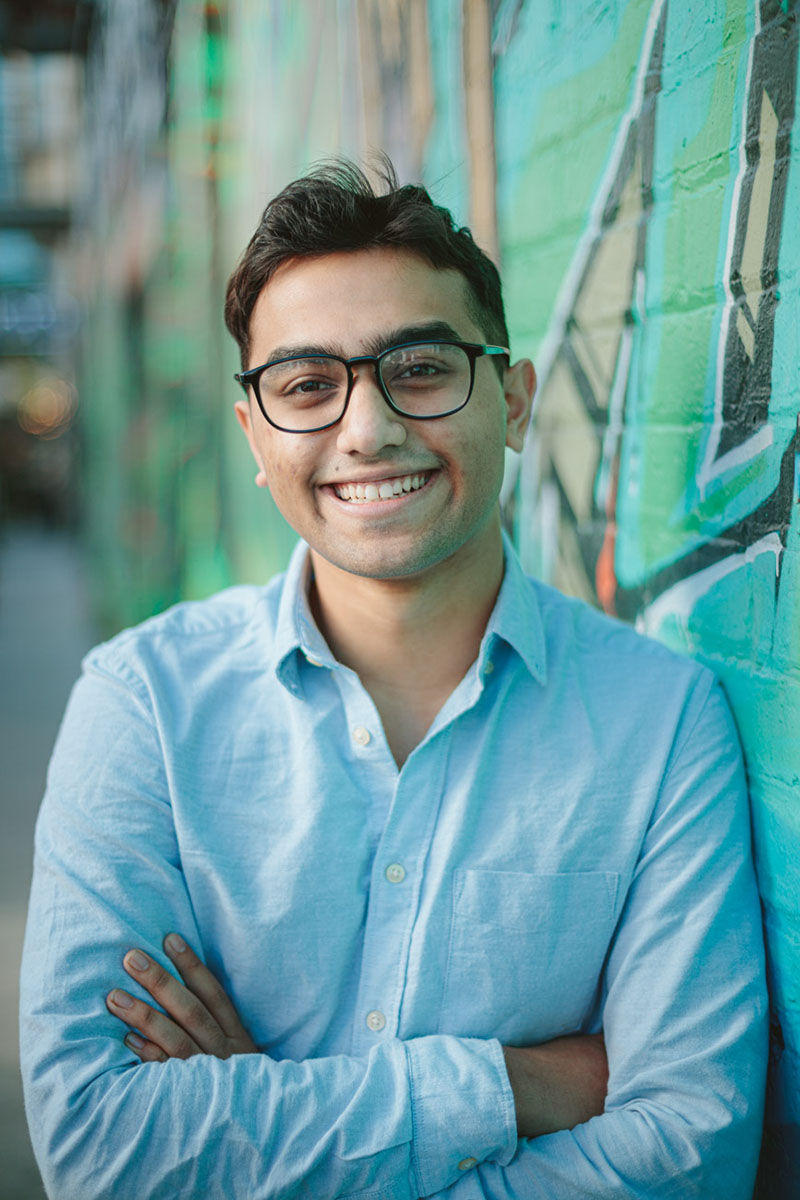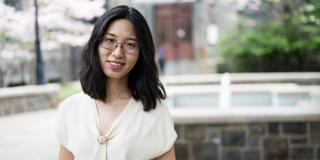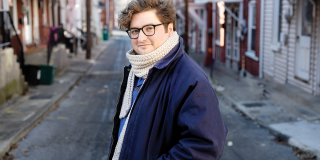Eckardt Scholar Raihan Alam ’23 creates a group dedicated to addressing tough sociocultural and political issues
San Francisco native Raihan Alam ’23 ran a Google search to find a liberal arts college far from home where he could gain independence, have quality instruction, and build relationships with professors, while not going into complete debt. His parents immigrated from Bangladesh and became U.S. citizens, and Alam knew that no matter where he went to college, he had to make the most of his opportunity.
 “There’s been a little bit of pressure to do well in school given that I am a first-generation college student and need to make use of the hard work of my parents,” says Alam, whose father is a self-employed driver and his mother, a homemaker, recently took a part-time job to help with her son’s student loans.
“There’s been a little bit of pressure to do well in school given that I am a first-generation college student and need to make use of the hard work of my parents,” says Alam, whose father is a self-employed driver and his mother, a homemaker, recently took a part-time job to help with her son’s student loans.
One of the opportunities Alam pursued was accepting Lehigh’s invitation to join the highly selective Eckardt Scholars honors program in the College of Arts and Sciences (CAS). The program emphasizes intellectual curiosity, independent work, and close mentoring relationships between students and faculty. Dual majoring in psychology and political science, Alam arrived at Lehigh seeking forums or clubs that offered good faith, but difficult and honest dialogue about sociocultural and political issues. Not finding what he was looking for, he exhibited the attributes of an Eckardt Scholar--determination and leadership--and launched the Douglass Dialogues Club this fall while taking classes remotely from home because of the pandemic.
“I wanted a place where anyone who wanted to talk about important issues can just do that. The only thing that we preselect for is passionate, intellectual curiosity,” said Alam, who named the club after abolitionist Frederick Douglass, who believed that free speech should grant people the right to be exposed to views and examine them in a respectful manner.
“Raihan's intellectual curiosity and willingness to explore complex questions from a variety of different perspectives exemplify the qualities we seek in Eckardt Scholars,” says Jenna Lay, associate professor of English and director of special programs in CAS. “In creating Douglass Dialogues and seeking to foster conversations about difficult and pressing issues with students from across the university, he is forging broad connections across disciplines and outside of the classroom.”
Alam has had great peer support in developing the club from an idea he originated during the summer to an operative club in September. Declan Coster ’23, an electrical engineering major with minors in entrepreneurship, computer science, and applied mathematics, holds the same appreciation for open discussion and is the club’s vice president. A member of the Undergraduate Student Senate, Coster is helping Alam navigate the process of getting the club recognized as an official student organization, which is hoped to be by the end of the fall semester. Club secretary and social media manager Julia Bebout ’21, an earth and environmental sciences and biological sciences major, coordinates club promotion and communicating with members.
Because many Lehigh students are attending fall classes remotely, Douglass Dialogues meets via Zoom every other Monday at 6:00 p.m. ET. The topics are decided upon democratically during the off week with Bebout sending out a Google form through GroupMe enlisting topic ideas from the 50+ participants. Subjects are voted on and the winner and supporting resources such as pro and con articles and YouTube videos are distributed prior to the discussion.
Questions tackled have included deliberating what ethical lines science should not cross, probing whether civil disobedience and rioting are effective and moral means of making change, and discussing if socialism is the way of America’s future. To keep the hour-long meetings from not turning contentious, community-designed rules are followed that include tenets such as disagree with the idea and not the person, do not interrupt, do not hold grudges, and be mindful of your speaking length.
“The Douglass Dialogues is different from other clubs because we are designed to create an educational impact through peer-to-peer, long-form discussion. Our club is not designed around competitions or certain majors, making it best-suited for our overarching goal of intellectual impact,” Coster says.
Club advisor Nitzan Lebovic, the Helene and Allen Apter Chair in Holocaust Studies and Ethical Values and professor of history, was immediately impressed by the enthusiasm and sharp, critical minds of the club organizers.
“An interest in cutting-edge ideas is the muse that brings all seven liberal arts—the trivium and quadrivium—together. This club plans an exceptional series of events and dialogues, and it is my duty and mission to help them realize it,” Lebovic says.
Between 20 and 30 members zoom into meetings from distant locales including Connecticut, Minnesota, California, Mexico, Florida, New Jersey, Wisconsin, and Pennsylvania. Alam said the challenges of a virtual setting are the time zone differences and that a lot of the passion and emotion in the conversations are hard to see. His goal for the club is to gain more members and to invite intellectuals on a regular basis to present their research and findings on topics with a Q&A. Once the club becomes an approved student organization, Alam will ask the university for speaker fee funds.
Chad Kautzer, associate professor of philosophy, was the club’s inaugural guest speaker and presented The Global Rise of Authoritarianism and Nativism: The Example of US Gun Culture. Currently writing a book about race and political violence, Kautzer spoke about how a militarized gun culture in the United States, among both civilians and law enforcement, relates to the rise of authoritarian populism around the world.
“It was an honor to participate in Douglass Dialogues,” Kautzer says. “I applaud the initiative of the students and appreciated the insightful questions and thoughtful conversation that followed my talk.”
Alam plans to continue taking advantage of his Lehigh opportunities remotely during the spring 2021 semester. He was granted a Dale S. Strohl ’58 Award for Research Excellence in Humanities and Social Sciences and will be working with his academic advisor, Michael Gill, professor and chair of psychology, to explore interventions that might help people remain open-minded and able to listen even when they feel that they—or a group to which they belong—are being subjected to criticism. Alam is appreciative of the Strohl grant and the financial aid package that he received to make his Lehigh education attainable, which includes the Donald B. and Dorothy L. Stabler Scholarship and the Jacob B. Krause Scholarship.
Reflecting on his flagship club, he remarks, “We are just a club that has discussions that you are afraid to have at Thanksgiving. Not only is food not thrown, we actually learn from each other.”
- Dawn Thren






